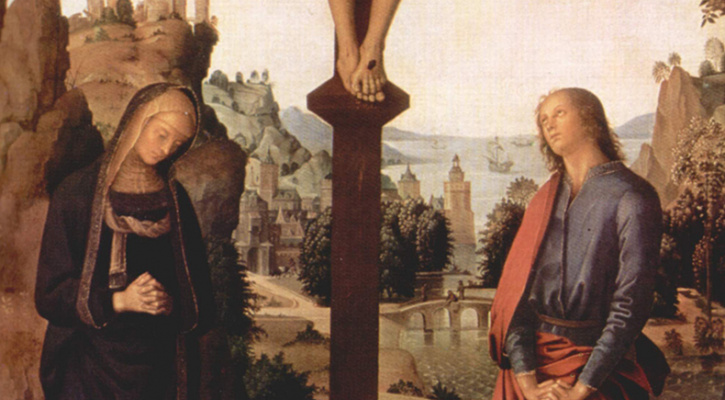Saint of the day for December 27: the story of St. John the Apostle

Saint of the day for December 27nd
(6-100)
The story of St. John the Apostle
It is God who calls; humans respond. The vocation of John and his brother James is very simply stated in the Gospels, together with that of Peter and his brother Andrew: Jesus called them; they followed. The absoluteness of their answer is indicated by the story. James and John “were on a boat, with their father Zebedee, to mend the nets. He called them and immediately they left their boat and their father and followed him ”(Matthew 4: 21b-22).
For the three former fishermen - Peter, James and John - that faith had to be rewarded by a special friendship with Jesus. Only they had the privilege of being present at the Transfiguration, the resurrection of the daughter of Jairus and the agony in Gethsemane. But John's friendship was even more special. Tradition assigns him the Fourth Gospel, although most scholars of modern Scripture consider it unlikely that the apostle and the evangelist are the same person.
John's gospel refers to him as "the disciple whom Jesus loved" (see John 13:23; 19:26; 20: 2), the one who lay down beside Jesus at the Last Supper, and the one to whom Jesus gave the exquisite honor of caring for his mother while John stood under the cross. “Woman, here is your son…. Behold your mother ”(John 19: 26b, 27b).
Due to the depth of his Gospel, John is usually regarded as the eagle of theology, hovering over high regions where other writers have not entered. But the always frank Gospels reveal some very human traits. Jesus gave James and John the nickname "sons of thunder". Although it is difficult to know exactly what it meant, a clue is provided in two cases.
In the first, as Matthew says, their mother asked to be allowed to sit in the places of honor in the kingdom of Jesus, one to his right, one to his left. When Jesus asked them if they could drink the cup that he would drink and be baptized with his baptism of sorrow, they cheerfully replied, "We can!" Jesus said they would indeed share his cup, but he could not give the one sitting on his right. It was for those for whom it was reserved by the Father. The other apostles were outraged by the brothers' erroneous ambition, and Jesus took the opportunity to teach them the true nature of authority: “… [Who] wants to be first among you, will be your slave. Likewise, the Son of man did not come to be served, but to serve and to give his life as a ransom for many ”(Matthew 20: 27-28).
On another occasion, the "sons of thunder" asked Jesus if they should not invoke fire from heaven on the inhospitable Samaritans, who would not welcome Jesus because he was on his way to Jerusalem. But Jesus "turned and rebuked them" (see Luke 9: 51-55).
The first Passover, Mary Magdalene "ran and went to Simon Peter and the other disciple whom Jesus loved and said to them," They have taken the Lord away from the tomb and we do not know where they have put him "" (John 20: 2). John remembers, perhaps with a smile, that he and Peter ran side by side, but then "the other disciple ran faster than Peter and came first to the tomb" (John 20: 4b). He did not enter, but waited for Peter and let him in first. "Then the other disciple also went in, the one who arrived first at the tomb, and he saw and believed" (John 20: 8).
John was with Peter when the first great miracle after his resurrection occurred - the healing of the man paralyzed from birth - which led to them spending the night together in prison. The mysterious experience of the resurrection is perhaps best contained in the words of Acts: "Observing the boldness of Peter and John and perceiving them as ordinary and ignorant men, they [the questioners] were amazed and recognized them as companions of Jesus" (Acts 4 : 13).
The apostle John is traditionally considered to be the author of even three letters from the New Testament and the Book of Revelation. His Gospel is a very personal story. He sees the glorious and divine Jesus already in the incidents of his mortal life. At the Last Supper, John's Jesus speaks as if he were already in heaven. John's is the Gospel of the glory of Jesus.
Reflection
He is very far from being anxious to sit on a throne of power or to call upon fire from heaven to become the man who could write: "The way we knew love was that he gave his life for us. ; therefore we should lay down our lives for our brothers ”(1 John 3:16).